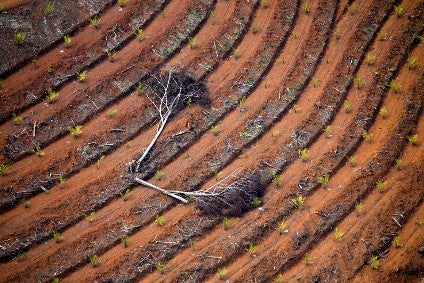
Environmental pressure group Greenpeace International says some global food companies such as Kraft Heinz, Kellogg, Ferrero and J.M. Smucker are failing to disclose their sources of palm oil despite an initiative to clamp down on deforestation by producers before the end of the decade.
The non-governmental organisation dedicated to improving the environment said it challenged 16 members of industry body The Consumer Goods Forum (CGF) at the start of the year to show what progress they were making to cleaning up the palm oil supply chain under a pledge made in 2010 to protect forests and limit climate change under a 2020 deadline.

Discover B2B Marketing That Performs
Combine business intelligence and editorial excellence to reach engaged professionals across 36 leading media platforms.
“We called on them to disclose publicly the mills that produced their palm oil and the names of the producer groups that controlled those mills,” Greenpeace said in a statement yesterday (19 March). ”If disclosed, this information would show whether brands had forest destroyers in their supply chains.”
Greenpeace also named Hershey, PZ Cussons and Johnson & Johnson among the eight companies that have so far failed to make disclosures.
Kellogg chief sustainability officer Diane Holdorf told just-food it is in on-going discussions with Greenpeace and has shared details of its list of suppliers.
She added: “Although a very small user of palm oil, Kellogg has directly engaged with global palm oil suppliers and stakeholders since we began responsibly sourcing palm oil in 2009. We will continue to work through our supply chain – from suppliers to processors to growers – to ensure that palm oil Kellogg uses is sourced from plantations that uphold the company’s commitment to protect forests and peat lands, as well as human and community rights.”

US Tariffs are shifting - will you react or anticipate?
Don’t let policy changes catch you off guard. Stay proactive with real-time data and expert analysis.
By GlobalDataIn a statement sent to just-food, PZ Cussons said: “At a scheduled meeting with Greenpeace on the morning of 19th March 2018 we provided a list of all our key direct palm oil suppliers and the mills from which they source. This information is also available on our TFT Transparency Hub page via links to our suppliers’ public dashboards, which are updated on a quarterly basis. We’re still seeking permission from four remaining small suppliers in Africa to share their mill traceability data with Greenpeace.
“PZ Cussons is committed to ensuring that the palm oil used in our products is responsibly sourced, respects local and indigenous communities, protects animal habitats and does not contribute to deforestation.”
A note on Ferrero’s website says the company ”believes that the traceability and transparency of the palm oil supply chain are the first steps towards the true transformation of the entire sector”, adding it plans to disclose its full list of mills on 15 May.
Some companies named by Greenpeace are honouring their commitments. The NGO said eight CGF brands – Nestle, Mondelez International, Unilever, Mars, General Mills, Reckitt Benckiser, Colgate-Palmolive and Procter & Gamble – have made disclosures.
Greenpeace said: “Although there is widespread agreement on the need for rapid and far-reaching action, political and corporate commitments are failing to translate into measurable results on the ground. Agricultural commodities such as palm oil continue to drive deforestation and emissions – and push endangered species like orangutans and tigers ever closer to extinction.
”Global brands must not walk away from the agreed milestone – an end to the link between deforestation and globally traded commodities by no later than 2020.”
The NGO said decades of deforestation from oil palm plantations has not only set the conditions for forest and peat-land fires but also endangered the health of people across south-east Asia, exploited workers and encouraged child labour.
At the time of writing, Kraft Heinz, PepsiCo, J.M. Smucker, Hershey and Johnson & Johnson had not replied to just-food’s requests for a response.
But since this story was written PepsiCo has sent through a statement. It said: “Having previously disclosed our full list of direct palm oil suppliers, PepsiCo has now published the list of mills that produce our palm oil.
“We welcome Greenpeace’s efforts to increase transparency and believe progress to address deforestation and human rights can only happen through continued collaboration with partners across our supply chain. PepsiCo remains committed to our goal of 100% certified sustainable palm oil by 2020.”





